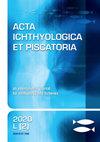在斐济市场调查中,三种珊瑚礁鱼类(Actinopterygii)的许多未成熟个体和体型最大的类群缺乏雌性:对渔业管理的影响
IF 1
4区 农林科学
Q3 FISHERIES
引用次数: 0
摘要
数据有限的渔业受益于使用生活史特征作为目标鱼类的生物指标。我们使用基于组织学的生殖分析来估计2010-2019年斐济市场调查中三种常见珊瑚礁鱼类的成熟尺寸、人均产卵量以及未成熟个体的数量和生物量。我们研究了赤蝽(Lutjanus gibus, forssk本文章由计算机程序翻译,如有差异,请以英文原文为准。
Many immature individuals and largest size classes lacked females for three coral reef fishes (Actinopterygii) in Fiji market surveys: Implications for fishery management
Data-limited fisheries benefit from using life-history traits as biological indicators of targeted stocks. We used histology-based reproductive analyses to estimate size at maturity, per capita egg production, and the number and biomass of immature individuals in the catch for three common coral reef fishes in Fiji market surveys during 2010–2019. We studied Lutjanus gibbus (Forsskål, 1775), Parupeneus indicus (Shaw, 1803), and Chlorurus microrhinos (Bleeker, 1854), which represent three families: Lutjanidae, Mullidae, and Scaridae, respectively. Fork length comprising 50% mature individuals for females of L. gibbus was 22.7 cm, that of P. indicus was 25.9 cm, attaining 38.0 cm for C. microrhinos. Females were rare or absent in the largest size classes of all three species. Immature fish represented up to 50% by number and 41% by biomass of the catch in market surveys, with P. indicus having the greatest immature number (8%‒50%) and biomass (6%‒41%), followed by C. microrhinos (20%‒30% by count, 11%‒18% by biomass) and L. gibbus (9%‒28% by count, 5%‒14% by biomass). Individuals ≤ 30 cm for L. gibbus and P. indicus and ≤ 45 cm for C. microrhinos were responsible for ≥ 90% of egg production per spawning. Skewed size-specific sex ratios suggested that exploitation of the largest size classes had minimal effect on overall egg production. Decreased catches of immature fishes would increase the reproductive population sizes for these species.
求助全文
通过发布文献求助,成功后即可免费获取论文全文。
去求助
来源期刊

Acta Ichthyologica Et Piscatoria
FISHERIES-ZOOLOGY
CiteScore
2.20
自引率
0.00%
发文量
31
审稿时长
>12 weeks
期刊介绍:
ACTA ICHTHYOLOGICA ET PISCATORIA (AIeP) is an international, peer-reviewed scientific journal that publishes articles based on original experimental data or experimental methods, or new analyses of already existing data, in any aspect of ichthyology and fisheries (fin-fish only).
 求助内容:
求助内容: 应助结果提醒方式:
应助结果提醒方式:


